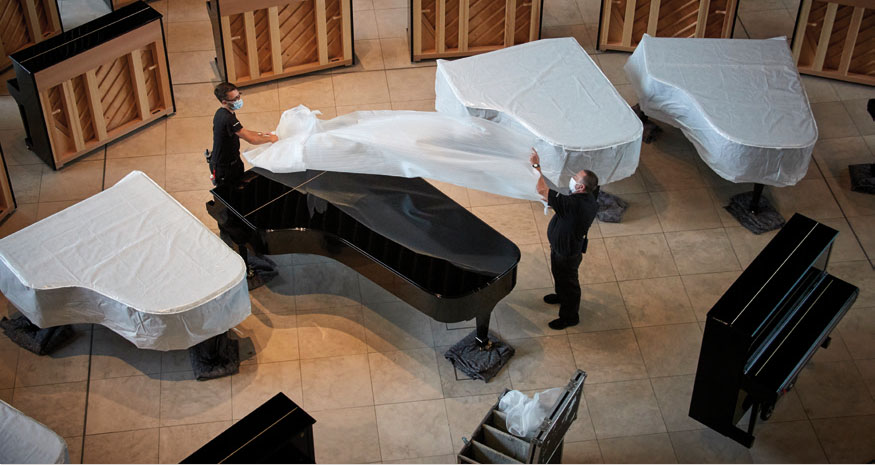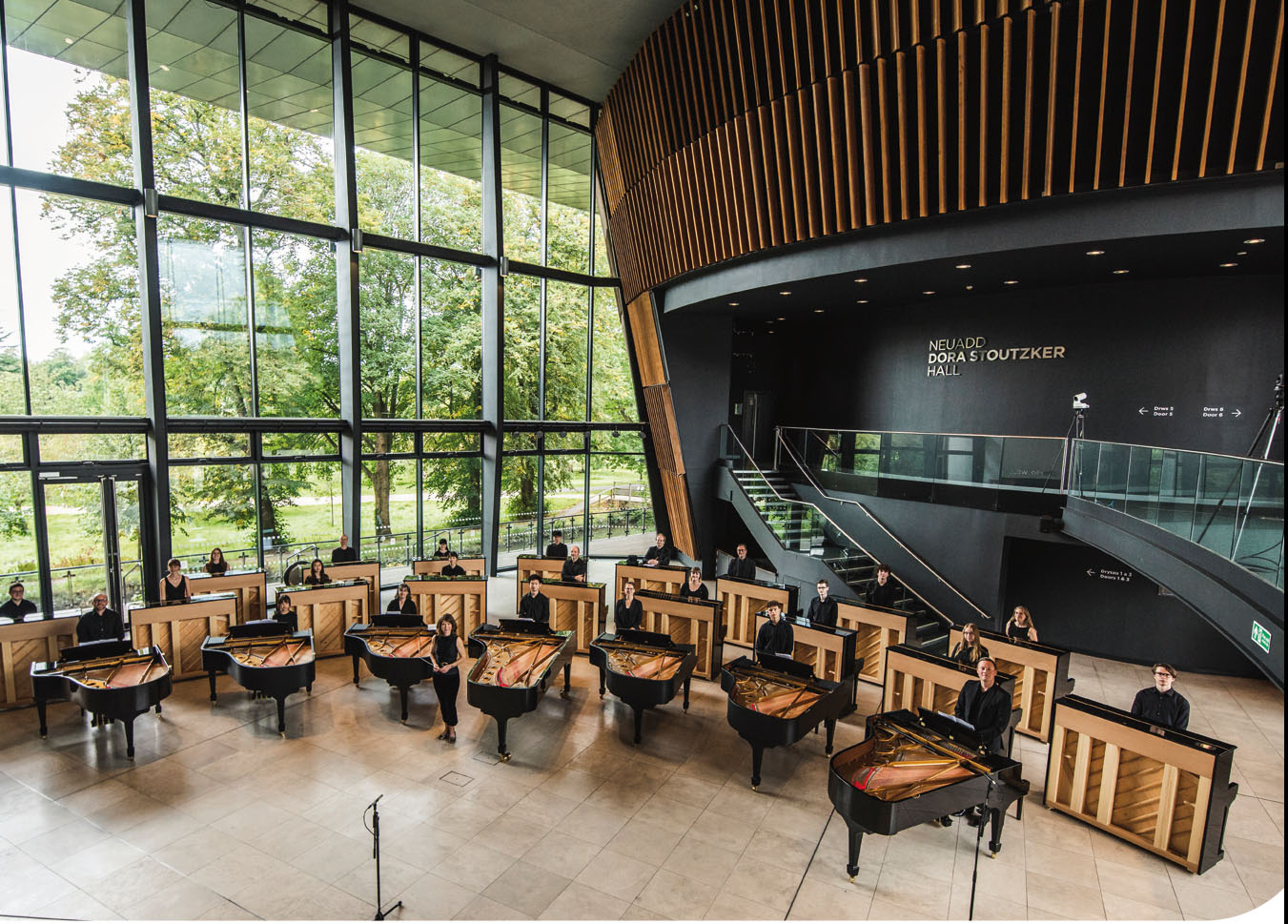
Few top-flight drivers would consider turning up to a Formula 1 race in an old banger and expect to pass the chequered flag ahead of McLarens and Ferrari. In a musical context, that could be playing a virtuoso piano concerto on a battered old instrument rather than a sleek concert grand.
Students at the Royal Welsh College of Music and Drama (RWCMD) now find themselves in the fast lane of topflight academies, having become the world's first Steinway Exclusive Conservatoire. In all, there are 64 pianos available for teaching, practice, and performance. There are many All-Steinway Schools around, but the distinction of a Steinway Exclusive – a new brand first revealed for the Cardiff institution – is very different. All pianos are Steinways, rather than the company's mid-market Boston or entry-level Essex pianos.
All the world's a stage
‘We had been an All-Steinway School since 2009, says Simon Phillippo, head of keyboard at the College. ‘We were the first in the UK, but now there are lots of schools, particularly specialist music schools and some universities. The arrangement is blossoming internationally.’
On the Conservatoire's new status, he continues: ‘It's been a real draw for recruitment, particularly international students. When we say we are Steinway Exclusive, it conveys a commitment to musical excellence. Working with an institution like Steinway is historically important and encapsulates these values. It is a really positive message to give before you even begin to think about the value of these pianos. What students have here is what they find on a concert stage anywhere in the world.’

Julia Plaut conducting from the balcony at RWCMD © KIRSTEN MCTERNAN
The Boston and Essex pianos were fine for practice but are not as sturdy or expressive as a Steinway and they don't last as long, according to Phillippo. ‘The original lease negotiated mentioned a renewal point. At the point of refreshing the fleet of pianos, we started to consider completely upgrading to top-grade Steinway instruments. It seemed impossibly ambitious.’
The pianos are leased, therefore not a capital expense, but part of the upgrade includes an enhanced relationship with Steinway. A new piano technician was recruited, and the company played a crucial role in that appointment and there is a constant dialogue between the post-holder and the company.
One question Phillippo grapples with is range and variety. Is it worth young players having the chance to play an excellent piano? His answer is an emphatic yes. ‘When you are playing a Steinway, you develop your touch, your ear, your imagination and the reality of a sound. You broaden your range and your ambition. Students could work up to playing a Steinway but if you start them off on one, you start with the strongest possible toolkit.’
Bigger picture
How does this considerable investment square with the focus of higher education funding (in England, certainly) shifting to STEM – science, technology, engineering, and mathematics – subjects, as well as medicine courses? Although some conservatoires have received injections of cash, there have recently been cuts to funding in England for ‘high-cost’ arts subjects, although this is not replicated in Wales: funding for RWCMD remains the same this year as last. The Public Campaign for the Arts and others talked about threats to the viability of courses in English universities, with music, dance and performing arts in the firing line.
In Cardiff, recruitment seems to be robust and is buoyed up by the Steinway world-first announcement. Across the border, the story is a little different. Michael Allis looks after the Master of Music (MMus) performance route at the University of Leeds. ‘The type of student who applies to this type of course has changed enormously over the years and it is growing fast,’ he says. ‘We normally get around 250-plus applicants for the MMus programme. I would say that around 90 per cent of applicants come from China and, of that figure, 90 per cent are pianists, so the demand is still there.
‘We don't take big numbers. We had 14 students who started in January. Of those, 11 were Chinese pianists. This is the area of growth. There have been years when we have more singers. Sometimes we get more mature students who have come back to study, but pianists are the main people we recruit.’

Steinway pianos being delivered to RWCMD © KIRAN RIDLEY
It is something of a rarity to get British students on these courses. ‘We get three or four a year,’ says Allis. ‘One of the difficulties is that we find that if you have done an undergraduate course in music and you want to move into performance, would you do that “top up” at a university? Why not a conservatoire? But one advantage of doing a postgrad at somewhere like Leeds is that you can continue to a PhD in performance. Some performers are surprised that they enjoy the academic side of the MMus, so they stay on to do a PhD.’
Any cut to funding for music courses at higher education levels in England may put more pressure on undergraduate recruitment. ‘One issue is that A Level Music is not being taught at some schools anymore, so that cuts the number of potential undergraduates. So, we've changed recruitment criteria,’ says Allis. ‘We don't ask for A Level Music, but if someone has Grade 8 in performance, Grade 5 in theory, and they're doing an essay-based subject at A Level, that's felt to be comparable.’
Understanding excellence
Meanwhile in Cardiff, celebrations continue. To mark the arrival of 24 new pianos – including a Model D concert grand, four AS grands and two Spirio grands – a new piece called 24 Pianos was performed by Junior Conservatoire students, present students, postgraduates, and staff. The piece, a refraction of fragments drawn from the Welsh folksong The Bells of Aberdovey, was written by composer and RWCMD postgraduate student, and now college tutor, Julia Plaut.
A bassoonist and Royal College of Music graduate, Plaut moved to Cardiff and became head of primary music at Cathedral School, Llandaff. She talks of her passion of early years childhood music education, especially her new charity called Little Live Music which has attracted funding from Tŷ Cerdd and offers music lessons to youngsters for a reduced or non-existent fee.
‘What a treat it was to write 24 Pianos,’ she says. ‘Looking ahead, I have had a chamber choir who will be performing at the Little Concerts. Having pianos such as these to work on with singers ups my game in a major way. I find colours I did not know I could create. If that happens for me as a non-specialist, I cannot imagine what it is doing for a specialist. As an educationist, I feel that children need to understand what excellence feels like. Some parents think, because their child can play Twinkle Twinkle, they have arrived. So, we have lost that understanding of real excellence. Steinway pianos are showing students what excellence can be like.’
Effects on recruitment are already being felt at the college. Even before its ‘Exclusive’ status, new graduate Amy Reynolds from Bristol suggests that nowhere else had the pianos or the facilities that are available in Cardiff. ‘Now we've had the delivery of the 24 pianos, we have top quality instruments to practise on all the time instead of having to hunt for the best instrument,’ she says. ‘I have friends at other colleges, and they are a tad jealous!
 Performance of 24 Pianos with Julia Plaut at RWCMD © KIRSTEN MCTERNAN
Performance of 24 Pianos with Julia Plaut at RWCMD © KIRSTEN MCTERNAN
‘We have Steinway artists who come to perform on the instruments we perform on, so we are constantly having to up our game to try to get better and perform better and be the best musicians we can be,’ Reynolds continues. ‘All keyboard students are invited to Steinway Hall in the summer term to have a look around, see the technicians, see what they do, and we see all the different models they have. Technicians come to College once a year and give us a talk about the instruments and how they are made.’
Steinway also sponsors a scholarship, and the College is looking at running a series of Steinway-sponsored masterclasses. ‘These will take place all around Wales,’ says Phillippo. ‘That's a really important bit of outreach for us. Pianos are not that portable, but the Steinway brand is, as is the Royal Welsh College.’
The College has also become the first to embrace Steinway's Spirio technology, which enables remote masterclasses, performances, and auditions, thus enhancing outreach opportunities in Wales and around the world. The college has two self-recording and self-playing pianos. ‘We are going to start using it in our performance classes from this year so we can record our performance, then sit back as an audience member and hear ourselves playing in that room,’ says Reynolds. ‘That's a great way to learn.’








